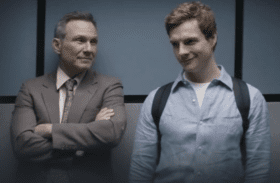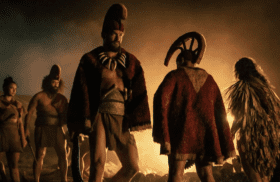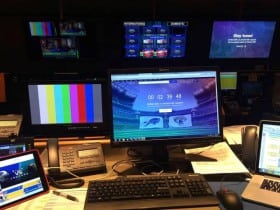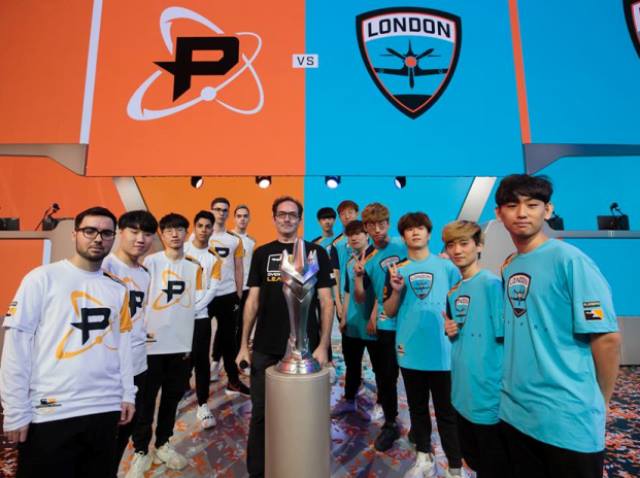Turtle Beach is adding Manchester City under its umbrella, partnering up with Manchester City eSports to serve as the official esports and gaming headset partner for the team, with all of the team’s pro players using Turtle Beach’s latest products. Manchester City’s next test in the virtual world will be at the eWorld Cup Final at the O2 Arena, London.
Esports-based cryptocurrency company Esports Ecosystem has reportedly signed on as a sponsor for EVO this week, joining Cygames and NISSIN Cup Noodles as sponsors for the event.
Reality Gaming Group locked in a major sponsorship for its upcoming mobile AR combat game Reality Clash with Denmark-based esports community, Sørby. The deal will see the Reality Clash logo on Sørby team shirts, throughout the Sørby Academy and during Sørby’s participation in the upcoming Supreme Masters Counter-Strike tournament in Switzerland, marking the first move into eSports for the Reality Clash brand, which will launch tournaments of its own when the game is released later this year.
After laying claim to the crown at ELEAGUE CS:GO Premier 2018, Astralis followed up with a new partnership in tow. The team announced a partnership with the makers of fitness drink NOCCO, which will now incorporate Astralis into its group of NOCCO Ambassadors, which now include the Swedish national ice hockey team, NFL pro Andreas Knappe and the two Olympic swimmers Michelle Coleman and gold medalist Pernille Blume.
Esports squad the Pittsburgh Knights cooked up a new partnership with Totino’s, makers of Party Pizzas and Pizza Rolls, and marking the brand’s first time sponsoring an esports team. “The Knights are extremely excited to be partnering with Totino’s,” says James O’Connor, Pittsburgh Knights President. “It’s great that a major brand identified us as doing the right thing in this space and also wanted to support and grow esports. It means a lot to everyone who’s been working so hard behind the scenes.” The team is currently competing in PUBG, Fortnite, Super Smash Bros., and Hearthstone.
FanAI found that esports fans on average have 18% more disposable income than the typical American. But this begs the question, where are fans spending that extra money? Using real world purchasing data, FanAI determined that esports fans spend above the national average in many non-gaming categories. Attending pro sports games, going to the movies, visiting theme parks, and frequenting museums are all entertainment categories not associated with the stereotypical gamer, but the data clearly shows esports fans spend more than the average American on these activities. Brands looking to enter esports should keep this non-gaming spending in mind when planning their strategy to reach this audience.
The Overwatch League Grand Finals, which ran July 27-28, saw an estimated global average minute audience across both days of 861,205, with coverage spanning Twitch, MLG; in China on ZhanQi TV, NetEase CC, and Panda TV; and broadcast to domestic audiences on ESPN, ESPN2, ESPN3, and Disney XD, along with a highlights show on on ABC. According to the company, the US average minute audience hit 289,175, with an estimated 45% of that total, or 129,792, falling into the 18-34 demographic. Worldwide, the 18–34 average minute audience was 605,013.
Examining year one of the league, Nielsen dove deeper into the data, providing Cynopsis with notes from the Overwatch season. Takeaways from season one include: 90% of the Overwatch League Season 1 viewer base (cross-platform) in the US being under age 35, with 2 in 3 viewers in the coveted 18-34 age group. Not only are US Overwatch fans valuable demographically – they are also heavier spenders on gaming overall, spending 55% more money on gaming-related activities/products than the average esports fan monthly according to Nielsen Esports Fan Insights survey data. Six in 10 have purchased a product related to esports or competitive/elite gaming in the past year. Finally, data from Nielsen’s Esport24 sponsorship valuation platform shows that 43% of Quality Index (QI) Media Value delivered to league and team partners of the Overwatch League was driven by non-endemic brands, compared to an average of 33% seen across all 2017 & 2018 events covered by Esport24 to date.
Stay current on the esports ecosystem, be sure to check out CynopsisEsports.com for deeper dives into the day’s breaking stories.
Meanwhile, the ELEAGUE CS:GO Premier 2018 Playoffs delivered a spike in average concurrent viewers on Twitch, with year-to-year gains of 43% over the 2017 event.
FACEIT unveiled viewing figures for the Minors throughout July, as teams from Asia, CIS, Americas and EU competed for a spot at the Major this September. The company reports that total hours watched across the four regions amounted to over 6.4m excluding Chinese viewership which marks growth of more than three times over the number of hours watched for the last Minors. The Europe Minors alone saw 4.3 million hours watched, peaking at 147k concurrent views and 82k average viewers, excluding Chinese viewership. Average viewers and hours watched were more than triple that of the last two EU Minors.
Rogue announced that team athlete and top Fortnite streamer, Benjamin “DrLupo” Lupo shattered several fundraising records as a part of the St. Jude Children’s Research Hospital PLAY LIVE campaign. With a total of $659,300 raised for St. Jude this year, DrLupo broke the St. Jude PLAY LIVE records for largest donation per hour rate, most raised by a single fundraiser in a calendar year and most cumulatively raised by a single fundraiser during a four-hour stream as a part of a week-long, 24-hour charity stream conducted by GuardianCon. (Don’t miss DrLupo at the Esports Business Summit!)
Millennial Esports Corp. appointed Stephen Shoemaker to the dual roles of CEO and President of the company, following the conclusion of Bob Reif’s tenure as President and former CEO Alex Igelman’s transition to Executive Chairman. Shoemaker previously served as Head of Global Finance for Millennial.
Ian Curran was named COO and President of Sega of America. Curran will report to Tatsuyuki Miyazaki, CEO of Sega West, and will be responsible for “utilising all resources available to maximise the profitability of the publishing and Sonic business units within the Americas and EMEA.”
ESL is restructuring operations in the Asia-Pacific Japan region. As part of the process, ESL is appointing Nick Vanzetti and JB Hewitt, current Managing Directors of ESL Australia, as Managing Directors for the region. Sebastian Radu, current Interim Chief Executive Officer, will be stepping down from this role. Additionally, Nick Vanzetti will also take on the role of a Senior Vice President for the region, overseeing ESL’s brand operations in Asia and relocating to the Singapore office in January 2019.














